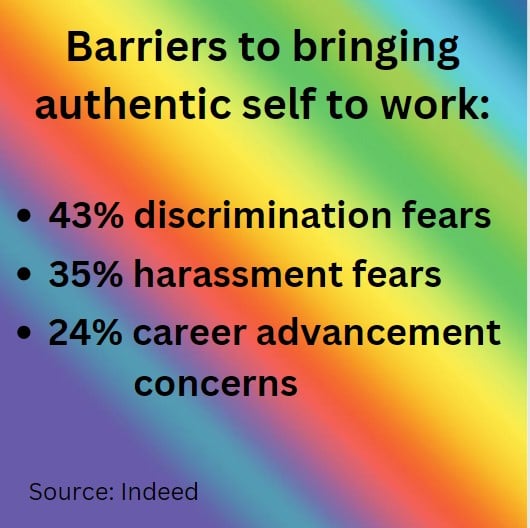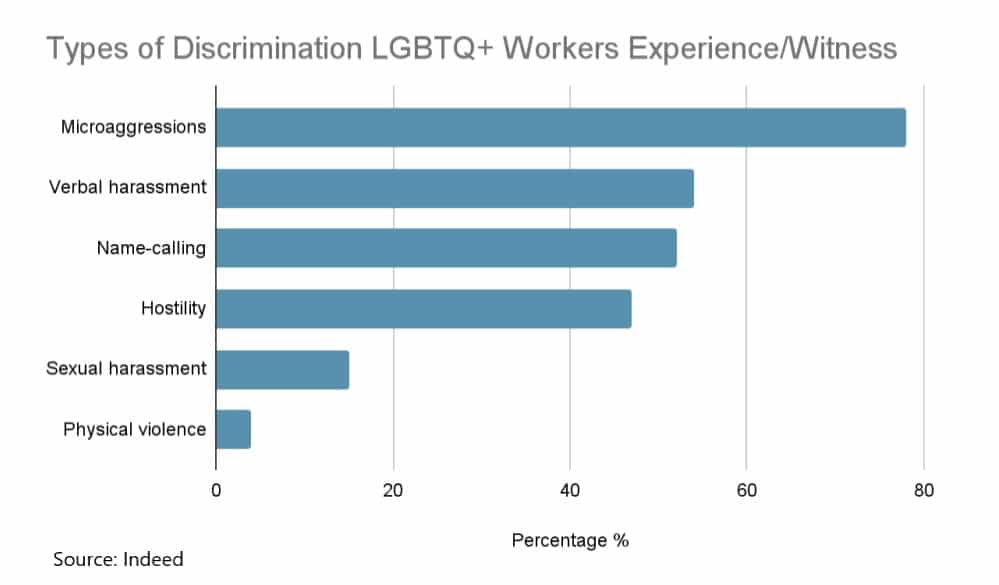A growing wave of anti-LGBTQ legislation and recent attacks against Target, Anheuser Busch, Kohl’s and other employers over Pride Month activities can potentially make a challenging situation even harder for some employers seeking to support and hire LGBTQ employees.
Such recent events, for example, can give employees pause in wanting to come out as a member of the LGBTQ community at work, or consider applying for jobs at employers based in states where recent anti-LGBTQ legislation has passed. That would not bode well for the troubling statistics employers already face when it comes to supporting and recruiting employees from the LGBTQ community.
According to a newly released survey by jobs site Indeed.com, the vast majority of 732 full-time, adult U.S. workers who identify as LGBTQ have not come out to all of their work colleagues.
“Employees will continue to navigate their own circumstances related to being out at work, but what we know for sure is that the upward or downward movement of statistics like these is directly related to the environment [and] community in which people live,” Erin Uritus, CEO of Out & Equal, a workplace advocacy group that supports the LGBTQ community, tells HRE.
She notes, however, employers that provide a welcoming, inclusive environment where employees can see that being out and their authentic selves is considered a positive and strength to the company may feel a sense of basic safety and security to help them navigate coming out.
Why LGBTQ employees hold back from bringing their authentic selves to work
What’s stopping employees back from coming out at work?
Some survey participants fear potential violence, others do not feel close enough to co-workers to make that disclosure and some fear they will be terminated.
But of all the reasons cited, fear of discrimination and harassment looms the largest.
 “In order [for employees] to truly bring [their] authentic sel[ves] to work, which is a right, employers need to ensure all sexual and gender expressions feel included and have a sense of belonging,” says LaFawn Davis, senior vice president of ESG at Indeed, in a statement.
“In order [for employees] to truly bring [their] authentic sel[ves] to work, which is a right, employers need to ensure all sexual and gender expressions feel included and have a sense of belonging,” says LaFawn Davis, senior vice president of ESG at Indeed, in a statement.
And when it comes to the way discrimination manifests in the workplace, survey participants cited micro-aggressions at the top.
Microaggressions towards the LGBTQ community come in the form of misgendering and using incorrect pronouns, assuming the status of someone’s relationships, parental status and family, Uritus says. Micro-aggressions can also occur with gendered dress codes to historical assumptions over what constitutes professional hairstyles to jewelry and more, which, she notes, are not unique to only LGBTQ people.
 Although 89% of survey participants say their companies have a nondiscrimination policy, nearly 1 in 4 say their companies do not enforce it, while 26% note there is no formal procedure to report discrimination to the HR department.
Although 89% of survey participants say their companies have a nondiscrimination policy, nearly 1 in 4 say their companies do not enforce it, while 26% note there is no formal procedure to report discrimination to the HR department.
Steps to take to attract and retain LGBTQ employees
In addition to working to curb discrimination, there are other areas employers should concentrate on to offer a more welcoming environment for LGBTQ employees and candidates.
With 57% of survey respondents believing employers should offer LGBTQ specific benefits, that could serve as a guidepost; however, only 23% of survey respondents report that’s a step their employer takes.
LGBTQ-specific benefits, according to Indeed, include such items as:
- Healthcare services with access to LGBTQ-friendly providers
- Same benefits extended to employees’ domestic partners
- Gender-affirming surgical care for employees and their dependents
Another key attraction and retention tool is an employee resource group. Although 81% of LGBTQ workers say ERGs create a comfortable work environment and a similar percentage note it helps with their wellbeing at work, only 34% say their company offers an LGBTQ ERG.
“One of the biggest lessons we see companies learning in the past few years is how important it is and what an asset it can become to leverage LGBTQ and other employee resource groups in ways that help the company stay on top of community and customer sentiment,” Uritus says.
Anti-LGBTQ legislation may keep workers away
Although there are a number of things within an employers’ control to create a supportive, safe and inclusive environment for current and prospective LGBTQ employees, restrictive state legislation is harder to confront, and the impact can be great.
And the move to pass anti-LGBTQ legislation is growing. Last year, a historic 315 anti-LGBTQ bills were introduced across the U.S., reports the Movement Advancement Project. This year, within the first five months, a whopping 490 anti-LGBTQ bills were introduced, according to the American Civil Liberties Union.
It turns out 65% of survey participants are concerned that such legislation would affect their prospects for employment, with 77% of this group hesitant to even apply for a position in states that have advanced such measures, according to the survey.
Those stats suggest that it’s more important than ever for employers need to take actionable steps to provide for their LGBTQ employees.
“The LGBTQ community is a strong part of the American workforce and smart employers have realized they need to better support their LGBT+ workers because, when they do so, it helps drive their business forward,” says Scott Dobroski, career trends expert at Indeed, in a statement. “When employees are authentically themselves at work, we also know productivity and morale increase as well.”
Credit: Source link










